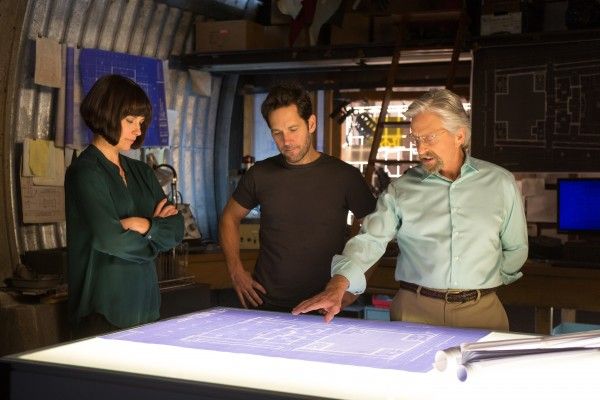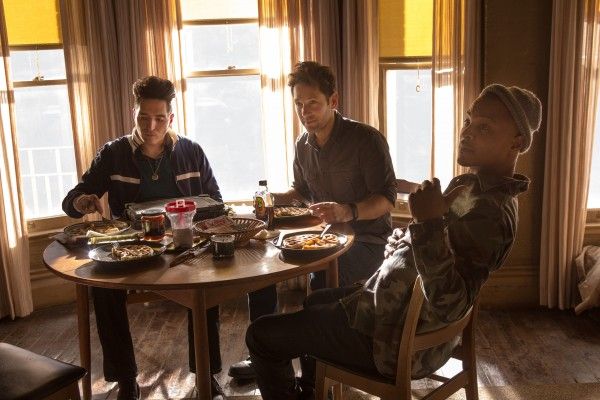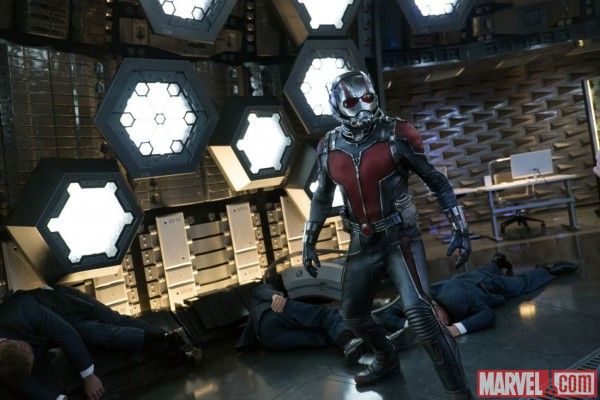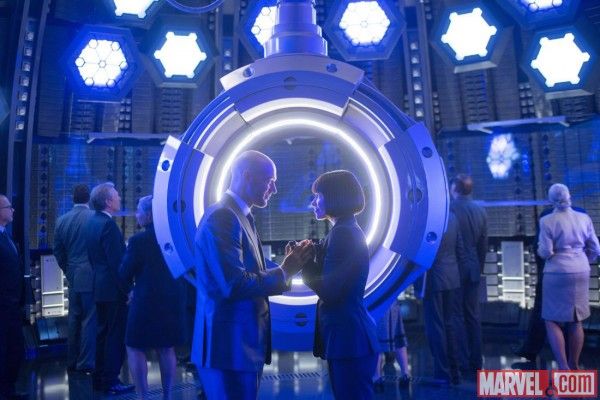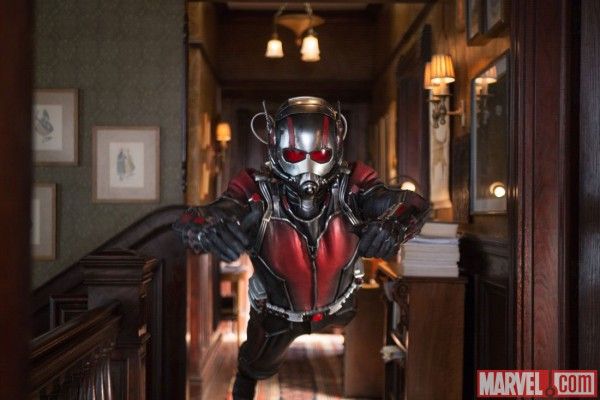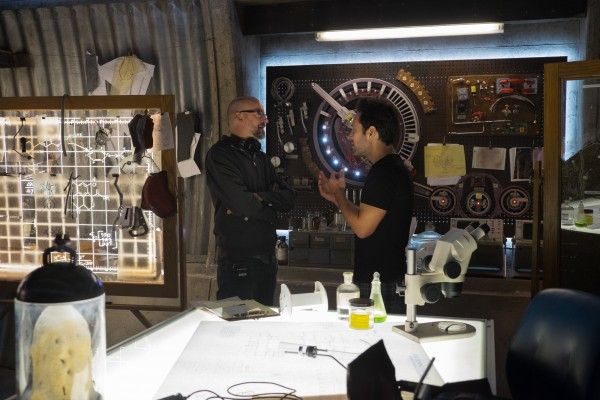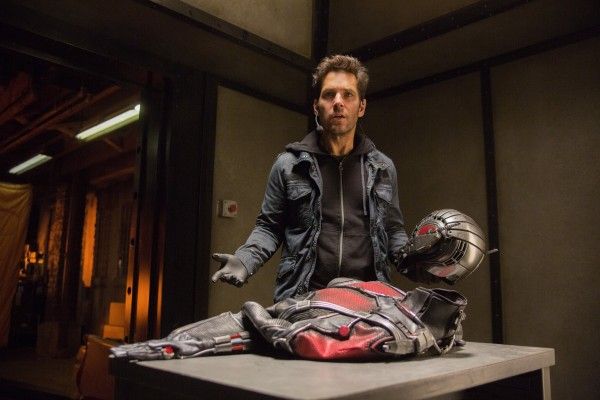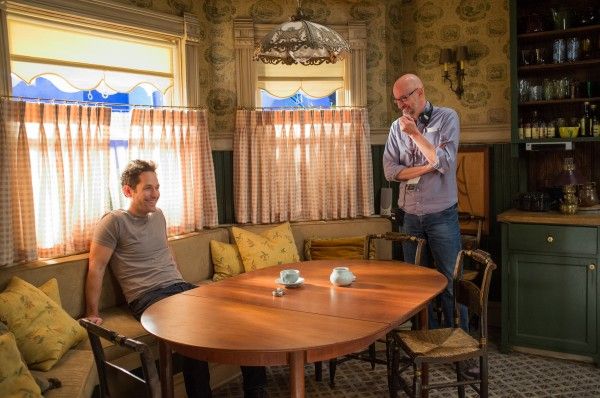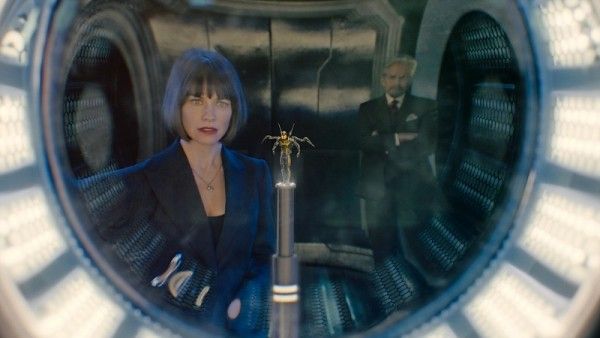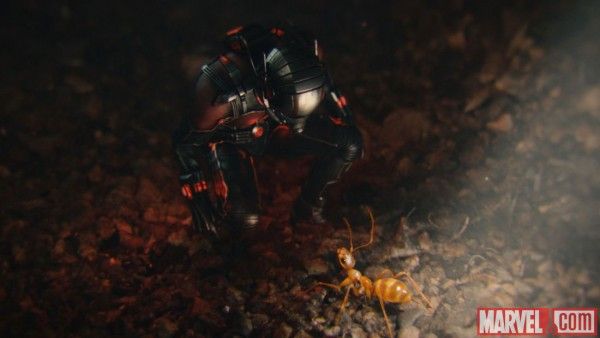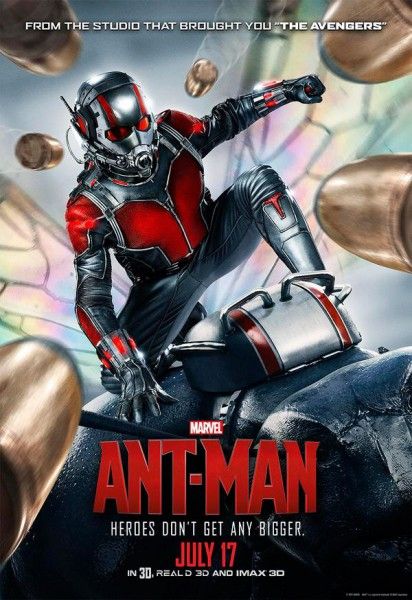For Ant-Man, the next evolution of the Marvel Cinematic Universe, award-winning composer Christophe Beck has written a score in the grand symphonic tradition of his favorite superhero movies, with a sweeping scope and a big, catchy main theme. His massive score for the insect-sized Avenger’s big screen debut combines action-packed superhero themes with fun and comical elements. Beck’s diversity is evident in his wide-ranging body of work, from the Oscar-winning Frozen to Edge of Tomorrow, The Hangover and Pitch Perfect. He collaborated previously with Marvel in 2014 writing the song “Blind Man” for The Amazing Spider-Man 2 and scored Elektra in 2005.
In our exclusive interview, Beck discussed his collaboration with director Peyton Reed, finding the right tone for the movie, their initial idea to do something very cool and high concept with a crazy electronic tangent, Kevin Feige’s input that led to a more classic symphonic approach, what makes the score stand out among other Marvel movies, balancing the energy of the action with the humanity of the characters to create a sophisticated storytelling experience, dealing with a chaotic and intense schedule, using instinct and experimentation to develop his major themes, the trickiest scene he created music for that became one of his favorite cues in the movie, Jerry Goldsmith’s influence, his upcoming films, Sisters and The Peanuts Movie, and more.
Check it all out in the interview below:
How did this project first come together for you?
CHRISTOPHE BECK: I’d actually done not exactly a Marvel movie but a movie with Marvel characters way back when. It was a movie called Elektra, which is still one of my favorite scores actually. I believe there was one meeting at one point with Kevin Feige. I don’t even know if he remembers that. It was quite a long time ago. But since that point, and since the Marvel guys took control of their characters, I would get a sniff here and there at the possibility of being involved with one of their projects and it never got further than that. In the last couple of years, especially after the success of Frozen, I guess the sniffs were getting a little closer, but I still couldn’t quite break through. One of the guys who championed me the most throughout all this time is a music supervisor named Dave Jordan who has worked I think on every Marvel movie since they made their own studio and many before that as well. He was the one who was suggesting me every once in a while. So, when Ant-Man came up, of course, being a comedy makes me with the amount of comedies that I have done over my career a bit of a stronger fit for this film than perhaps any other Marvel film, maybe with the exception of Guardians of the Galaxy because that’s a comedy as well. It was a bit of an easier sell for that reason. The other thing that really helped, I think, was Peyton Reed, who directed the film. He and I basically worked on our first feature film together on a cheerleading movie called Bring It On. That was even longer ago than Elektra was.
Can you talk about your collaborative process with Peyton Reed and the approach you took in terms of crafting the sound and helping him realize his vision?
BECK: At first, I had some crazy ideas for what we might do to portray the insect of it all. He’s a fan of all kinds of music, but especially electronic music, as am I. We got excited about doing a glitched out, digital, electronic, skittery score, almost like what a trapped robot spider might sound like trying to break out of a cage or something. It was really cool but also very high concept, and as Kevin Feige put it, he doesn’t love listening to music that makes him think that he broke his speakers. He’s a traditionalist when it comes to movie scores. He loves the classic symphonic approach with big themes and bold brass, so there was a bit of an evolution at the beginning of the process where Peyton and I went down this one road and then realized it wasn’t the right tone for the movie. In a way, it was just too slick and too polished and even just too weird and quirky. It was almost weird for its own sake. So, we settled on a more acoustic sound for the heist elements rather than go all electronic. It’s a nice blend of some electronic elements and real instruments like drums and bass guitar.
What do you think makes this score stand out among other Marvel movies?
BECK: I think it might be the same thing that makes the movie stand out. First of all, as I mentioned already, it’s really a comedy first and the only other Marvel movie that you could really say that about is Guardians of the Galaxy. There haven’t been too many of those. Also, at heart, this movie is a heist movie. It gleefully embraces a lot of the classic tropes that we all come to expect from heist movies. It’s an origin story so, of course, there are going to be some training scenes. In addition to that, you also get these elaborate montages that show the planning of the heist, which is something you’ve seen in many heist movies as well. The fact that it’s a heist movie gave me a little latitude to use a rhythm section and something a little bit more funky and jazzy and groovy that I wouldn’t otherwise have been able to get away with.
When you’re scoring a superhero movie like Ant-Man, how do you balance the energy of the action that we see up on the screen with the humanity of the characters and their story?
BECK: That’s a great question, because it’s important not just to play the action on screen as a composer, but to find that other level of storytelling. What’s really going on during this two-minute battle sequence? Sure, there’s punching and kicking and explosions, but what are the characters feeling? What’s the point of view of the character? I think that always results in a more sophisticated storytelling experience to be able to communicate with your audience on more than one level. Of course, I’m constantly looking for ways to do that. One of the best ways to do that is to have really strong themes for either the characters or certain situations or certain story points. Of course, we have that here. We have our main superhero theme, but there’s also a theme for family, and that’s a really important part of this film, particularly the father-daughter relationship. And, of course, there’s Scott Lang’s relationship with his daughter, which is the first time that kind of relationship has been explored in any Marvel film, I believe. There’s not just one but two, because you also get Hank Pym and his daughter working out their issues as well. Because of that, I think there was a lot of opportunity to just play the emotion of a particular scene and not worry too much about the mechanics of whatever action was going on.
Do you usually try to play your music from the point of view of the story’s main character and write it to their point of view?
BECK: I would say usually is the correct answer, but it really depends on what’s happening in the story at that point. Ideally, the film is being directed by a filmmaker who knows exactly what point of view he or she wants the music to take. But a lot of times we don’t quite know. So, it’s a process of experimenting. It’s not always the main character. A lot of times a scene will get more power if you play it from a different character’s point of view.
Can you talk about your process of composing a score? Do you do all your compositions in sketch form and deal with the harmony and the counterpoint first, and then do the orchestration after that?
BECK: It varies. I would say, given a luxurious schedule where I don’t need to work very quickly, in that case the orchestration and arrangement is inseparable from the composing to me. I prefer not to think of it in terms of just notes on a page, you know, a lead sheet, what the tune is, and what the chords are, but to really think of the colors and the timbres and the instruments chosen and if there are electronic elements. What type of a color, what type of a role do they play in filling out the entire sonic picture? That all happens at the same time. But, on a movie like Ant-Man, in which the schedule is so demanding, it’s a little bit more of a team effort. I will save time. I will sketch out a cue and then pass it off to one of the guys on my team to flesh it out. Usually, that means a piano sketch where I’ll literally pull up a sample piano and just write the cue on a sample piano, occasionally pull up a brass or strings or some kind of generic percussion patch just to indicate certain ideas with lots of verbal descriptions typed into the file itself, and then pass it off to one of the guys on my team to finish it. I can work very quickly that way, and on a project like this, which is about as chaotic and intense schedule-wise a production as you’ll ever find in the world of film scoring, that’s a necessity.
When you’re developing your major themes, how does the choice of instruments vary depending on the type of film and the context of a scene?
BECK: I wish I could tell you that there was some kind of formula for that. Of course, there are what some people might call classic devices, while others might call them clichés that we associate with certain things in storytelling. Beyond that, it’s really a process of instinct and experimentation. Of course, it’s a superhero movie so I could not ignore the brass, especially given the more traditional tastes of the filmmakers who are running the company. So, as I was developing that main theme, which was the first thing that I did, anytime I either sat down to work something out at the piano or just in my head thinking about it, which I did a lot of before I actually put notes to the page, it was always going to be like French horns in my mind. That’s certainly not a surprising choice at all. In some ways, it’s the most obvious choice. It communicates immediately the type of classic sound that I know we were going for. So, those are the easy choices.
As for the rest, it’s a process of experimentation. There are so many different instrumental combinations to explore. I feel like I’m constantly learning new tricks and new devices and new, interesting combinations. For example, at the very beginning of the Ant-Man main theme, the melody is on alto flute. You hardly ever hear woodwinds in film scores these days. I think part of the reason why I could get away with something like an alto flute is it’s a little bit of the sound world of the heist movie and the spy movie, the old James Bond sound. That combined with violas is a very interesting combination. It’s down in the low register. That came as a result of just really a little bit of trial and error and trying out different combinations until I get something that sounds cool.
What character or situation was the most fun or challenging for you to create some music for in Ant-Man?
BECK: There was one scene in particular where Ant-Man is on a raft and there are thousands of ants and he’s essentially surfing on them down this water pipe. That was a tricky scene because at first I played it like a regular action cue where it was kind of intense. It was exciting musically maybe, but it was just a little too intense for the scene. Peyton really wanted to get a sense of fun out of this scene, like a sort of wish fulfillment fantasy. Wouldn’t it be awesome if we could just shrink to the size of an ant and go surfing on a thousand ants? And not, oh my God, is he going to be able to make it? Oh my God, is he going to be able to get into this place he’s trying to break into? There were several versions of the cue and each got progressively more lighthearted and fun, but it still wasn’t quite hitting the mark. Literally, a couple hours before getting on a plane, I finally [figured it out]. For some reason, I had resisted the whole surf aspect of it. I just thought it was too obvious a choice, but I finally just embraced it. I tried to do a piece that evokes the classic guitar surf music but without a guitar. I was replacing guitar with piano and the orchestra, but really keeping the feel of wild abandon that’s in a lot of the little surf tracks, and cranking up the tempo, and putting in lots of notes for the orchestra. The idea was to create Mr. Toad’s Wild Ride, just a crazy journey at a breakneck pace. That’s one of my favorite cues in the movie.
What happens if the studio gives you notes? Does that help focus or hinder your creativity?
BECK: (Laughs) Notes are part of life for any composer for hire. There’s no way around it. I think anyone who has done even a small number of films as a professional composer gets used to that idea pretty quickly. In this case, the collaborative process was pretty smooth. The most difficult part was really being able to find time, not for me necessarily, but for Peyton, the director, and Kevin to get them for an hour or two to sit down and listen to cues. It felt like by the end of the process, even though things went pretty smoothly, Peyton and I saw each other at the premiere and we said to each other, “I feel like I haven’t even seen you. I feel like we did a whole movie without even talking to each other.” It was because there was definitely less direction or action between us than you would expect on a film like this. But that’s just due to the fact that the entire production process at Marvel is very intense and Peyton did what he could to get away to come listen. Certainly, in the last couple of weeks, when the recording was coming up and we were starting to run out of time, Peyton and Kevin and all the rest of the top executives at Marvel made a special effort to make sure that they listened to the scoring and gave me their thoughts. And there weren’t that many thoughts. Kevin’s input was mostly at the beginning of the process when Peyton and I were off on this crazy electronic tangent. He just reined us in a little bit to remind us that we’re still making a Marvel movie and it still needs to sound like a Marvel movie. It can’t just be this crazy other thing.
How much of the music in this film did you compose and how much was used?
BECK: If I had to guess, I would say somewhere between an hour and a half and two hours of music composed, maybe even a little bit more than two hours. We did two sets of recording sessions, which is standard operating procedure for Marvel, because there are so many changes being made to the film after recording that usually it necessitates a little bit of re-recording. So, that also contributed to a third interesting number which is the amount of minutes recorded that were not used, which is pretty significant. I did manage to put a couple of those unused tracks on the album because they’re some of my favorites. I think we recorded all or part of more than half the music on the second go-around.
When there’s unused music, what becomes of it? For example, does it end up being used as a marketing tool by the film company in a behind the scenes with extra music under it or deleted scenes on the DVD?
BECK: They might, but in order to have that happen, somebody over there would need to sort of get the idea that there might be all this music that was not used. I don’t know that they would automatically know that or think that. They might look at the soundtrack which has 55 minutes of my favorite music on it and think that that’s sort of it. Obviously, it doesn’t even include a lot of tracks that were used in the film. I think if it doesn’t end up on the soundtrack, it kind of becomes obscure and gets forgotten. That’s okay. It lives on a hard drive somewhere in a vault somewhere. It’s Marvel’s to do with it what they please. Maybe there’s a marketing person somewhere who for some reason has some insight into the way the scores are made, and that there must be all this extra music somewhere that we could use, and maybe it’ll be a treasure trove.
You’ve collaborated with many directors. Is part of the fun of being a film composer the fact that every director you work with has a different vision and a different way of working, and some know more about music than others?
BECK: I wouldn’t say that was part of the fun. I would say that’s part of the adventure. It can be fun but it can also be less fun. Sometimes the personality or just the particular process of a director can really affect your quality of life as a composer in terms of how much time you spend away from your family or the amount of time you spend doing the type of work that you maybe don’t consider as fun to do as other type of work, like it’s a lot of rewriting as opposed to just writing. That can wear on you over time, of course. But I would say it’s the unpredictability. Each film does bring a new set of personalities and it can turn out great or it can turn out not great. I will tell you that’s the favorite part of every process though, before I know whether it’s going to turn out great or not, and it’s just nothing but potential and possibility, and I’ve only met the director once on the phone and once in person at a job interview, and he or she seems like an amazing person, and it’s going to be great. Who knows what amazing score I’m going to be able to write? Then we get into it. And then, reality hits and hopefully reality is nice.
When you’re collaborating with distinctly different directors, how does your approach differ?
BECK: The basic approach is the same. Their details might differ. There are some people that I work with who I know are very busy in their schedule. They have limited time to see me when they do come to see me, or when I go to them I only get a half an hour. So that will change how I plan my schedule and what cues I decide are the priority to work on that particular week. If I have a director who I know is generally more available, or even just loves hanging out half a day, all day with me, or whatever, that’ll be a different approach as well. That will be where I can take more time to really get into every cue instead of having to prioritize and pick the important ones. And of course, very quickly, I learn their particular tastes when it comes to music. Some filmmakers are really open-minded and others have very particular tastes. Or, with certain types, maybe there’s an instrument that smashed them in the face when they were a kid and they just can’t stand the sound of the clarinet that they were injured by when they were five years old.
How do you decide what you want to do, what’s right for you, and why are these films something that you choose to do?
BECK: Perhaps things are getting a little bit better in that regard, but I think it’s a bit of a fallacy to think that we choose our projects quite like that. Like I said, I’m at a point in my career now where I’m hoping to become more choosy. But the process of getting here, and sometimes I feel like I’m still in that process of building a career, I don’t think you have the luxury of being too choosy, because first of all, it’s so difficult to pick what you do based on a script. Sometimes you don’t even get to read the script. Sometimes it’s just a description and a cast and a director. Who knows? That could be a great movie or that could be a not great movie. We all want to work on great movies, but it’s really difficult to predict that. Sometimes you get a chance to see it and it just hits you. You know it’s amazing and you want to be involved, but it’s usually not clear cut at all. And given that fact, what are the other factors involved in choosing what to work on? It’s really about building relationships in this business. As everyone knows, careers are built on relationships. Even if it’s a bad movie, even if I know it’s a bad movie, even if it’s a team of filmmakers that I know are going to be difficult, that I know are going to really make me work extra hard, it’s fundamentally the same process.
How did growing up in Canada influence your music and inspire you? How do you feel your roots contributed to your development as an artist?
BECK: I can honestly say no one’s ever asked me that before. I have to say not at all. Culturally, Canada is so strongly influenced by what goes on here in the U.S. that they have protectionist laws. At least they did when I was growing up. While I was growing up, they enacted what were called Canadian Content Regulations, and the media in Canada was forced by law to play a certain percentage of their material by Canadian artists. Canada already has a big inferiority complex when it comes to American pop culture. So, growing up in Canada I imagine would be more or less the same as growing up anywhere in the U.S. as far as, as a kid, what music I listened to, what TV shows I watched, what movies I liked. I will say this though, being Canadian, early in my career these Canadian Content Laws evolved and eventually became these production incentives, where if you were an American film production company and you shot your film in Canada and hired a certain amount of Canadian people to work on it, you would get these big tax breaks. When this law first came into effect, it didn’t matter where the Canadian people you hired lived. As a Canadian living in Los Angeles, I was uniquely positioned at that point to have a much easier road to getting certain kinds of gigs where I could suddenly not have to worry about competing against ninety percent of my non-Canadian colleagues. And that really helped early on in my career when I was doing television to just get my feet off the ground and get my career going. So, I don’t think there is anything Canadian about the influences on my work and my music, but certainly being Canadian has affected my career trajectory.
At any point in your artistic career, was there music that really impressed you and made you say that’s what I’m aspiring to? Who or what were your inspirations?
BECK: When I went to USC, I was lucky enough to be there the one year that Jerry Goldsmith was teaching there. I can’t say that he was a formative influence on my music because that belongs to Depeche Mode, but when I went to USC is when I really discovered his music. And I would say as an influence on my film composing, his influence is absolutely supreme, particularly his emphasis on theme and melody and his ability to be so efficient with that material once he has a strong theme to be able to work that into every part of the score in so many different and creative ways. That was a huge influence on me.
Coming up, you have The Peanuts Movie and Sisters? How are those projects coming along? What kind of sound are you going for with each of them?
BECK: Sisters is a comedy that takes place during a house party. There’s not a lot of score music in there. There’s a ton of music, but most of it is what you might call needle drop. The entire middle section of the film takes place at a party where there’s a DJ playing music constantly. So, my role in that film, as in a few other films I’ve done over the course of my career, was to find a way to make the score work with all that song material and not have it feel completely schizophrenic. Peanuts has been really fun to work on. Of course, there’s iconic music associated with those characters by Vince Guaraldi, and it’s been really fun to find spots to incorporate not only Guaraldi pieces but also ways to honor his legacy by incorporating some of that pop jazzy style in some of my score.
Ant-Man opens in theaters July 17th.


